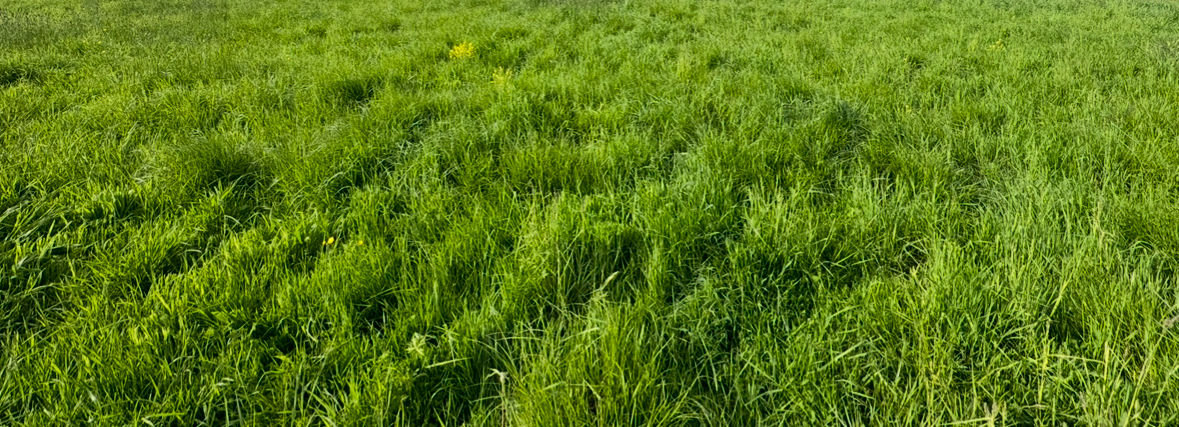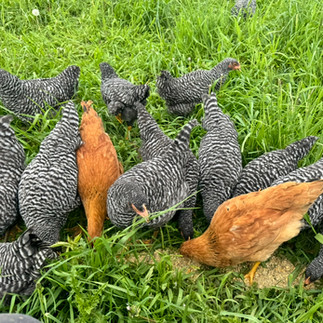Why Animal Psychology Matters (More Than You Think)
- ARR FARM

- Jun 30
- 7 min read
Something You Don’t Hear in the Grocery Store, or on Most Farms
You can tell how an animal was treated by how it tastes.
You can taste stress.
You can feel chaos.
You can see a life rushed, cornered, or confined in the fibers of meat that doesn’t nourish the way it should.
And yet most people don’t know this — because no one talks about it.
Not on packaging.
Not in ads.
Not on most farms.
Not in grocery store marketing.
But we do.
Because how animals think, feel, and respond to their world — their psychology — is one of the most overlooked and misunderstood pieces of regenerative, pasture-based farming.
And it’s the quiet key to stress-free meat that feels good to eat… and even better to
believe in.
Not What You Think
Animal psychology in farming isn’t about treating cows like pets or organizing turkey support groups with tissues and emotional check-ins.
(Though we’d absolutely watch that cartoon: “Feathers of Feelings — Tuesdays at 7.”)
It’s about something far more grounded — and far more powerful.
Animal psychology is the science of behavior.
It’s about understanding:
How animals perceive their environment
How they communicate with one another (and with us)
What they fear
What they prefer
And how stress physically manifests in their bodies
It’s biology, not sentimentality.
Just like you have preferences for how you’re handled in stressful situations — a calm conversation versus a loud confrontation, for instance — animals respond to the world around them in ways that either build trust or trigger fear.
Those responses aren’t random. They’re patterns. Shaped by:
Species
Individual temperament
Environment
History
Ignore those patterns, and you’ll spend your farming days fighting nature.
Work with them, and suddenly:
Animals grow healthier, with fewer interventions
The land thrives under their hooves, paws, and feet
The meat quality improves — clean, complex, nutrient-dense
This isn’t feel-good fluff.
It’s real. It’s practical.
And at ARR FARM, it’s how we work every single day.
Understanding animal psychology isn’t a bonus feature of good farming. It’s the foundation.
And it’s the reason why so much meat from grocery stores and most farms doesn’t taste right — not because it’s cheap, not because it’s frozen — but because it was raised in an environment of constant stress.
ARR FARM: Where Behavior Shapes the Land
We’re not your average operation — and that’s on purpose.
ARR FARM stands for Alterity Regenerative Ranching.
Alterity means otherness. A conscious departure from the norm.
Pronounced like “our”, this isn’t about convention or compliance — it’s about care, at every level of the system.
We believe food should come from a place where the land is respected and the animals live like they were designed to — not shoved through some industrial funnel for efficiency’s sake.
We raise:
Grass-fed, grass-finished beef and lamb
Pasture-raised pork, chicken, and turkey
Right here in Olean, NY.
And we do it regeneratively — no pharmaceuticals, no pesticides, no confinement.
But the heart of it is this:
We pay attention.
To the animals.
To the soil.
To the weather, the seasons, the subtle shifts in flock behavior or herd movement.
To what works in nature — and what doesn’t.
Because in a regenerative agriculture system, the animals aren’t forced to fit the farm.
The farm adapts to the animal.
That’s a radical shift from how things are done in most food systems — where animals are treated as units to be controlled, optimized, and streamlined for store shelves.
At ARR FARM, animals are part of the ecosystem.
Their behavior informs every decision we make — from fencing placement to rotational schedules to when we move the chickens or shift the lambs.
The result?
Calmer animals
Healthier land
Better food
A cycle that honors life — rather than extracting from it
Quick Science Hit: The Physiology of Stress
Let’s get a little nerdy.
(Stick with us — this is where it gets wild.)
When an animal is stressed, the body releases cortisol and adrenaline — just like ours do.
These stress hormones trigger a cascade of biological changes:
Muscle tension
Increased heart rate
Disrupted digestion
Altered immune response
Suppressed growth and reproductive functions
In plain terms?
It’s bad news for animal health — and meat quality.
Stress doesn’t just affect mood — it affects muscle chemistry.
It can literally alter the pH of muscle tissue, leading to:
Tougher meat
Sour or metallic flavors
Lower water retention (read: dry meat)
Shorter shelf life
Decreased nutrient bioavailability
These are the silent markers of distress.
They’re not visible on the label.
You won’t find a sticker that says, “Raised under constant pressure.”
But your body notices.
Your taste buds notice.
Your digestion notices.
This is why meat from most farms and grocery stores — even those labeled “natural” or “grass-fed” — can still taste bland, chewy, or “off.”
Not because it was frozen.
Because the animal was flooded with stress hormones for most of its life.
That’s why, at ARR FARM, we design every interaction — from the way we walk among the animals to how we move them through pastures — to reduce fear and stress at every turn.
Because when you start with calm, you end with quality.
On the Flip Side?
Animals that are moved gently, handled calmly, and allowed to live in natural social groups produce meat that is:
Tender
Flavorful
Rich in healthy fats and micronutrients
More shelf-stable (because it wasn’t biologically panicked at harvest)
These qualities don’t come from marketing tricks or fancy packaging.
They come from biology — shaped by psychology.
This isn’t just a farmer’s opinion.
It’s backed by decades of behavioral science and meat science.
Ask any experienced butcher — they’ll tell you:
You can see it in the muscle grain, smell it in the aging room, and taste it on the plate.
We’re not reinventing the wheel here.
We’re just paying attention to it.
One Quiet Morning on the Farm
Early light spreads across the pasture, and the air smells like green and gold and calm.
Our pigs grunt softly as they nose through a fresh paddock of forage, rooting with focus and curiosity.
No rushing. No yelling. No feedlot chaos.
Just pasture-raised pigs doing what they were made to do — exploring, socializing, thriving.
We watch one of our Idaho Pasture Pigs pause mid-root to glance up, ears flicking.
She senses a shift — the slight buzz of the fence, the freshness of moved ground, the subtle invitation of untouched forage.
She’s not stressed.
She’s tuned in.
Because pigs aren’t chaotic — they’re observant.
And when we work with that awareness instead of against it, the whole system runs smoother.
No drama. No tension. No flood of stress hormones.
Just a quiet win for behavior-based farming — the kind that doesn’t make headlines but makes all the difference.
Because trust isn’t built during the big moments. It’s built in the quiet ones — where animals are seen, understood, and allowed to be themselves.
And in those moments, health rises.
Stress never takes root.
And the flavor?
It speaks for itself.
Grazing With the Brain in Mind
Our entire system is built around one core belief:
Work with instincts, not against them.
We use adaptive multi-paddock grazing — a method that mimics how wild herds move:
Frequent rotations
Fresh forage
Low-pressure handling
Natural social dynamics
Constant observation and responsiveness
Why?
Because animals know what they need — if we pay attention.
Cows prefer dry, breezy areas for resting
Chickens avoid tall grass where predators might hide
Turkeys form flocks with pecking orders that reduce aggression if left undisturbed
Lambs are skittish — they want to feel safe, not trapped
When we align our management with those patterns, the entire regenerative farm system breathes easier.
Parasite loads drop
Immune systems stay strong
Stress levels plummet
And guess what? The flavor improves. Dramatically.
We’re not just optimizing for meat yield.
We’re optimizing for the experience of the animal’s life — because that experience becomes part of what you taste and feel when you sit down to eat.
Myth Busted: Meat Quality Isn’t Just About Breed or Diet
Let’s settle a common misconception:
It’s not just what an animal eats or what breed it is.
It’s how it lives.
Even a grass-fed steer can end up with bland meat if it’s stressed or handled roughly
Even a heritage pig can lose its flavor if fed junk or confined
Even the best pasture-raised poultry won’t taste right if the birds are overstimulated
At ARR FARM, we don’t raise meat.
We raise animals well — and meat becomes the natural result.
That’s a major difference from what you’ll find in most grocery stores and on most farms — where the animal is often an afterthought to the end product.
We reverse that:
The animal’s life — its calmness, its comfort, its ability to be itself — is the product. Everything else flows from there.
The Ripple Effect of Respect
Here’s something not enough people talk about:
When we treat animals with behavioral intelligence, the land thanks us.
Because calm, healthy animals:
Graze more evenly
Poop more predictably (yes, it matters!)
Disturb the soil at the right depth
Spread fertility across fields
Avoid overgrazing or under grazing
In short: Good animal psychology = good soil management.
And good soil = more nutrients in the food you eat.
Regeneration isn’t a gimmick. It’s a chain reaction: From psychology → physiology → ecology → your plate
It’s not about perfection.
It’s about participation — honoring the design of each creature so the whole ecosystem benefits.
No Guilt. Just Integrity.
Let’s be clear:
We’re not here to guilt you into anything.
This isn’t about shaming grocery store choices or crying over cows.
It’s about something far more practical — and empowering.
When you understand how animals think, you can see why regenerative farming works.
You can trust your food again.
And you can feed your family food that actually tastes like it was raised right — because it was.
You don’t have to be perfect.
You just have to start somewhere.
💌 Before You Go…
If this post made you breathe a little deeper, or see your dinner a little differently—welcome.
You’re not alone in wanting better.
You deserve real food from real people.
And we’re honored to grow it for you.
Get early access to farm stories, behind-the-scenes updates, and subscriber-only offers every week.
We’ll feed your inbox like we feed our animals — with integrity.
ARR FARM | Alterity Regenerative Ranching
Astonishing food. Rejuvenated land. Regenerative impact.















Comments